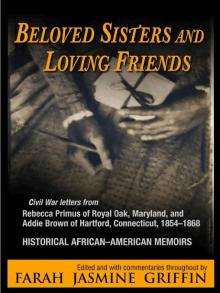Beloved Sisters and Loving Friends


Author: Farah Jasmine Griffin
Category: Other2
Published: 2014
Series:
View: 410
Read OnlineBeloved Sisters and Loving Friends: Civil War Letters from Rebecca Primus of Royal Oak, Maryland, and Addie Brown of Hartford, Connecticut, 1854-1868, Historical African-American Memoirs is rare glimpse into the lives of African-American women in New York, New England and the south during the Civil War era. Rebecca Primus, the daughter of a prominent black Hartford family, traveled south after the Civil War to teach the newly freed men and women. Addie Brown—a bright, spirited, intelligent woman—was a domestic servant who worked in various households in Connecticut and New York. Over one-hundred-thirty years later their letters were discovered, offering invaluable first-hand accounts of the female black experience in the American north and south during the Civil War and the Reconstruction. Edited and with an introduction, notes and commentary by one of the foremost African-American authors and scholars of our time, Farah Jasmine Griffin, Beloved Sisters and Loving Friends brings to light many new details that have been missing in American historical biographies. The letters Rebecca Primus wrote to her family reveal her confrontations with southern prejudice, her struggles to educate the freedmen, the practical effects of the politics of Reconstruction, and every-day events of life in Royal Oak, Maryland. The letters Addie Brown wrote to Rebecca from the north chronicle her struggles to make a living, her self-education, her growing political consciousness and, always, her enduring love for Rebecca, a love complicated by the courtship of men whom she feels compelled to consider for reasons of economic security. “This collection of the personal correspondence of two young black women during one of the most pivotal periods in U.S. history,” wrote Booklist, “provides not only a candid look at their relationship with each other, but also a new perspective for understanding the complexity of the social, political, economic, and cultural climate of the period.” "SUPERB,” wrote Henry Louis Gates. “The letters of Rebecca Primus and Addie Brown help us realize how much we still do not know about black thought and feelings in the nineteenth century. Farah Griffin has lifted one corner of the veil." "AN EXTRAORDINARY HISTORICAL FIND," wrote Publishers Weekly in a starred review, "[Griffin] persuasively concludes that documents such as these demand a rewriting of American history."
 Pattaya 24/7
Pattaya 24/7 Change of Heart
Change of Heart Renee
Renee Reader's Digest Soldier Stories
Reader's Digest Soldier Stories Wicked Games
Wicked Games Prison Princess
Prison Princess Untamed Passion--A Surprise Pregnancy Romance
Untamed Passion--A Surprise Pregnancy Romance Chasing Kona
Chasing Kona